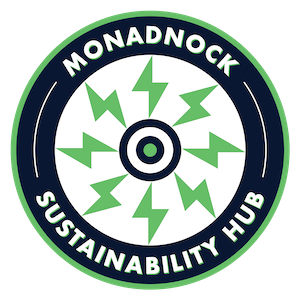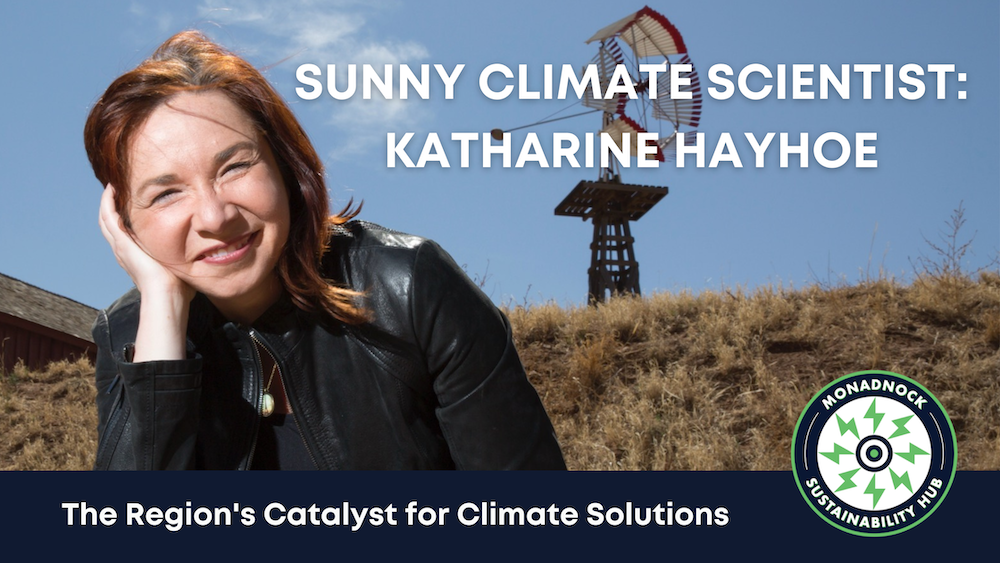By Gerald Burns, Monadnock Sustainability Hub
Originally Published in the Monadnock Shopper News
Let’s face it; climate scientists have developed an image problem. Like the Biblical prophets of old, they foresee a troubling future and have felt themselves duty-bound to warn people to change their ways in order to avoid the worst. In the process of delivering that message, they have come at times to sound like preachers of doom and gloom: “Code Red for humanity,” “uninhabitable earth,” etc.
But one scientist takes a sunnier approach to the challenge of dealing with climate change. Katharine Hayhoe begins her recent book, Saving Us: A Case for Hope and Healing in a Divided World, with what seems a low-stress proposition: “The most important thing anyone can do” to tackle the problem is to “talk about it.” But it is a meaningful starting point. While 64% of Americans say they are seriously concerned about climate, only 33% ever discuss the topic with others. This would seem to qualify as a type of denial, not so different from the more familiar kind that insists global warming is not happening or is nothing humans are responsible for.
Of course, the existence of the second type is one of the things that makes people hesitant to speak on the matter. Hayhoe acknowledges this and, in what is perhaps the most hopeful aspect of the “case” she makes, recommends a strategy for getting the communication going. First, she argues that only a supermajority—the “Us” in the book’s title—can effectively push back against the momentum of climate change. Second, she points out that only a tiny minority, about 7% of the U.S. population, are hard-core deniers, and she pointedly advises: Forget them; seek dialogue with the much larger number who may be doubtful, indifferent, or confused, but not barricaded in their position.
And she has advice, as well, about how to conduct these conversations, whether they take place among friends, in small groups, or in organizational, community, or governmental settings. First, while it is necessary to uphold scientific facts, don’t lead with them: no daunting statistics, no “Code Red” scenarios. In fact, don’t begin with climate change at all. Instead, try to find common ground and values shared among the participants. Which values? Potentially many: a good future for young people; public health; healthy wildlife; the traditional seasons; economic prosperity (including manageable utility prices); national security; border security. Only when a base of mutual understanding and trust, no matter how tentative, has been laid can a more inclusive concern for the effects of climate change be built.
This is the heart of the “case,” not the extent. For talk must translate into action. Here again, easy does it, especially at first. Focus on solutions that can be implemented locally and have already achieved some positive momentum (such as the transition from fossil fuels to increasingly cheaper clean energy sources). The purpose here is not only to produce concrete results and reductions in carbon emissions but to grow a sense of confidence that, individually and collectively, our efforts can make a difference (in contrast to the 50% of Americans who now feel “helpless” or don’t know where to start, in the face of climate change). This sort of empowerment has led to many of the great social movements and tipping points in history, from Western wagon trains to Civil Rights to the widespread kicking of the smoking habit. Hayhoe encourages the belief that it can “save us” from the worst consequences of an altered climate.
There can be little doubt that this is a “sunny,” optimistic program; how realistic it is remains to be seen. But it is certainly a different approach, one that aims not only at making headway against our most pressing environmental challenge but at helping to heal some of our most serious human divisions. What’s more, it fits well with ongoing initiatives in our region. The Monadnock Sustainability Hub has been focused intensively on energy transition. The Greater Keene & Peterborough Chamber of Commerce recently showcased successful transition projects by local businesses. And an activity called Climate Café is starting up: place and time to talk. We have the chance to try out Katharine Hayhoe’s sunny path right here and now.
Survey data from Yale report(s), “Climate Change in the American Mind.”
Author Bio
Gerald Burns is a member of the board of the Monadnock Sustainability Hub. He helped to found the Institute for Climate Action at Franklin Pierce and participates in the Citizens Climate Lobby, the Marlborough Energy Committee, and Fridays for the Future.

